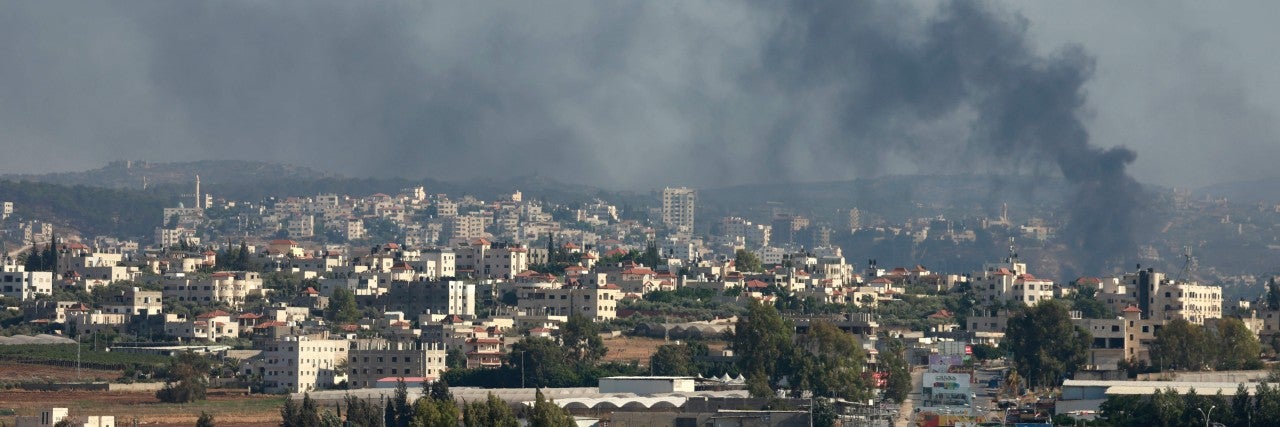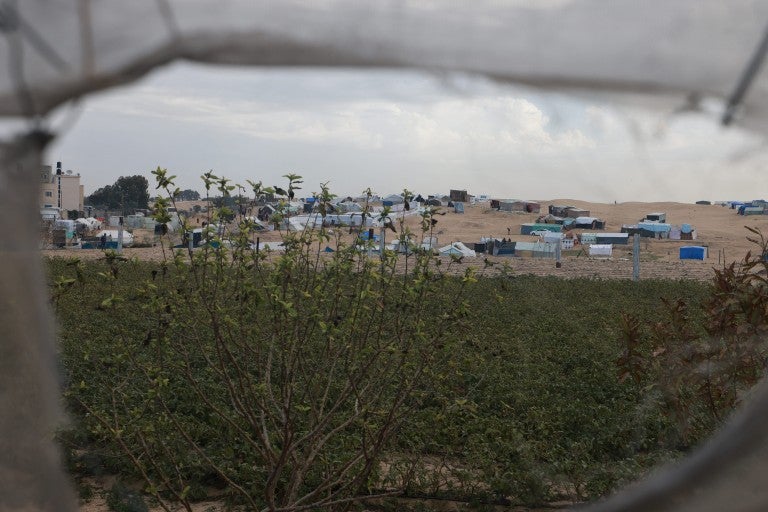July 6, 2023
The recent Israeli military operation in Jenin, the failed rocket attack, and the dozens of terror attacks dating back to early 2022 have put into focus the increasingly precarious security situation in the West Bank for Israel.
The weakening of the Palestinian Authority, which has controlled portions of the West Bank since the Oslo Accords in 1995, has opened up a security vacuum in the territory that has been filled by Hamas and Palestinian Islamic Jihad, two terror groups that have long been backed by Iran.
Here is a breakdown of the security situation in the West Bank and Iran’s role in fostering terrorism.
What is Israel doing to stop the terror threat in the West Bank?
Israeli security forces have been conducting near-daily counterterrorism activities throughout the West Bank. This is in large part due to the declining effectiveness of the Palestinian Authority security forces and their inability to maintain security. While these security activities, which began during the terror wave that started in the spring of 2022, have focused on neutralizing terror cells in the area and preventing further and sometimes imminent attacks, they have also led to a small number of unintentional deaths among Palestinian civilians caught in the crossfire.
In particular, Israeli security forces have focused on the terror threat from Jenin that has been ongoing for over a year, with part of this activity meant to thwart attempts to manufacture rockets in the West Bank. An Israeli counter-terror security activity on June 19, left five Palestinians dead, with at least three of the dead belonging to Palestinian Islamic Jihad. On June 21, an Israeli drone struck a vehicle carrying Palestinian gunmen who had opened fire at a checkpoint in the northern West Bank. The IDF said that the cell had been responsible for a number of recent shooting attacks in the area.
On July 3, Israel launched a major operation in the Jenin refugee camp to neutralize ongoing terror threats in the region. Over 1,000 Israeli soldiers were involved in the operation, the largest in the West Bank since the Second Intifada in the early 2000s.
The IDF said the operation’s goal was to “change the situation” in Jenin.
“The city of Jenin, and in particular the refugee camp, is a stronghold of terror that exports terrorism to the entire [West Bank] and the home front,” said Brig. Gen. Avi Blot, the chief of the IDF’s West Bank division, the Times of Israel reported.
“In the eyes of the enemy, the refugee camp has become a ‘refuge city’ and the IDF’s freedom of action in the area is challenged,” he said.
According to Blot, the mission in Jenin is to create operational control, thwart and arrest terrorists, destroy enemy infrastructure, and confiscate weapons.
Since 2022, nearly 50 shooting attacks were carried out by residents from the Jenin region, while an additional 19 wanted Palestinians have escaped to Jenin and sought refuge there, the IDF said.
Tragically, 29 Israelis have been murdered so far this year by Palestinian terrorists – nearly the total killed in terror attacks in all of 2022.
Israeli Defense Minister Yoav Gallant said that the IDF has dealt a “heavy blow” to terror organizations in Jenin and that the troops would “receive full support to do whatever is necessary and to operate on the ground and in the air, in order to protect the citizens of Israel and preserve full freedom of action throughout [the West Bank].”
In the two-day operation, 12 terrorists were killed and over 100 wounded. One Israeli soldier was also killed.
Israeli Prime Minister Benjamin Netanyahu said that the operation was not a one-off event and Israel could carry out similar operations if needed.
“At these moments we are completing the mission, and I can say that our extensive operation in Jenin is not a one-off,” Netanyahu said during a visit to a military post on the outskirts of Jenin. “We will eradicate terrorism wherever we see it and we will strike at it.”
In a statement, AJC CEO Ted Deutch “unequivocally” supported Israel’s right to defend itself.
Today, Israel took action to protect its people by launching a preemptive defensive operation in Jenin, the command post for a wave of terror attacks.
— Ted Deutch, CEO of American Jewish Committee (@AJCCEO) July 3, 2023
The objective: arrest terrorists and dismantle their infrastructure.
We unequivocally support Israel's right to defend itself…
Who was behind the failed rocket attack?
On June 26, Palestinian terrorists attempted to fire rockets from the West Bank. It was reported in Israeli media that the Israel Defense Forces had identified the Palestinian man behind the failed rocket attempt. A video had been published on Telegram by a group calling itself the Al-Ayyash Battalion – named for a Hamas bombmaker, Yahya Ayyash, who was killed by Israel in 1996.
According to the IDF, the homemade projectiles did not contain an explosive payload and did not enter Israel proper, landing inside Palestinian Authority territory. The IDF said that one rocket flew some 100 meters, while another failed and only traveled five meters.
The report said that the suspect behind the attempt is not linked to any known terror group.
Nevertheless, there has been a push by Palestinian terror groups to establish rocket capabilities in the West Bank.
In May, Ronen Bar, who heads Israel’s Shin Bet security agency, said that security forces had foiled an attempt by Palestinians in the northern West Bank to manufacture rockets to be launched at Israel. These efforts were apparently led by a senior Palestinian Islamic Jihad leader, Tareq Izz ed-Din, eliminated by he IDF in a targeted killing in the Gaza Strip during the escalation in early May.
Why is Iran interested in the West Bank?
Iran has been a strong backer of Palestinian terror groups such as Hamas and Palestinian Islamic Jihad for years. These terror organizations, while based in the Gaza Strip, have long operated in the West Bank and have seen their presence grow in recent years as the Palestinian Authority’s power has weakened. Both Hamas and Palestinian Islamic Jihad share a goal of Israel’s destruction and replacement with an Islamic Palestinian state. Notably, Hamas ousted the Palestinian Authority (PA) from the Gaza Strip in 2007 and has been the territory’s de facto ruler since then. While there have been attempts at reconciliation between Hamas and Fatah – the Palestinian faction that controls the PA – no breakthrough has been reached and the two factions remain bitter rivals. As such, Hamas and Palestinian Islamic Jihad, with Iran’s support, have been working to undermine PA rule in the West Bank and use the territory as a base to carry out terror attacks against Israel.
What is the relationship between Iran and Palestinian Islamic Jihad and Hamas?
Since the 1979 Islamic Revolution, one of the key priorities of the Iranian regime has been exporting its revolution abroad. Tehran has used its proxy army of more than a dozen militias and terror groups across the Middle East with outposts around the world to help foment instability, carry out attacks, and expand the scope of the Islamic Revolution.
Within the Palestinian arena, Iran has been the principal backer of Hamas and Palestinian Islamic Jihad, providing the terror groups with financing, weapons, and training.
While its origins are with the Muslim Brotherhood, Hamas has reportedly been funded, armed, and trained by the IRGC since the early 1990s. Hamas opened an office in Tehran in the 1990s. Supplied by Tehran, Hamas has used the rockets and funding to launch several wars against Israel from its base in Gaza, including in 2008, 2009, 2014, and 2021, which each saw thousands of rockets fired toward Israeli cities and towns, resulting in dozens of civilian deaths. Hamas has also used Iranian know-how to help build its extensive network of “terror tunnels” throughout the Gaza Strip and underneath the Israel-Gaza border to carry out terror attacks.
Originally inspired by the Muslim Brotherhood as well, Palestinian Islamic Jihad's co-founders later embraced Iran Supreme Leader Ayatollah Khamenei’s principles of jihad and the idea that Palestine must be liberated through armed struggle. This helped to usher in a close relationship between Tehran and Palestinian Islamic Jihad that has seen the terror group become the second largest in the Gaza Strip behind Hamas.
Palestinian Islamic Jihad has been behind two of the most recent major escalations with Israel in August 2022 and again in May 2023. In both escalations, the terror group fired thousands of rockets at Israel.
In recent weeks, both Palestinian Islamic Jihad and Hamas leaders have separately visited Tehran, meeting with senior Iranian leaders including Ayatollah Ali Khamenei and President Ebrahim Raisi.
In his meeting with Palestinian Islamic Jihad leaders, Supreme Leader Ali Khamenei told Ziyad al-Nakhalah, secretary-general of Palestinian Islamic Jihad, that “the growing power of the resistance groups in the West Bank is the key that can bring the Zionist enemy to its knees, and it is crucial that we continue along this path.”
He also commended Palestinian Islamic Jihad for its “strength” during the five-day escalation with Israel in early May, and noted that the internal divisions within Israel are presenting an opportunity for its adversaries.
“The current situation of the Zionist regime is vastly different compared to 70 years ago.… The Zionist enemy is now in a passive and reactive position,” he said.
Why isn’t the Palestinian Authority stopping terrorism?
Over the last decade, the Palestinian Authority has increasingly lost control of the security situation in much of the West Bank amid the Palestinian population’s widespread discontent with the PA and its leader Mahmoud Abbas.
As confidence in the PA has declined, terrorist groups including Hamas and Palestinian Islamic Jihad have stepped up their efforts to gain influence within the West Bank.
Terror attacks on Israelis are occurring more frequently, with many assaults originating in northern West Bank cities, such as Jenin and Nablus.
The PA has come under increasing pressure from the United States, Israel, and other parties to reign in terrorism from the northern West Bank. While these terrorists have been behind attacks on Israelis, they have also targeted PA security forces as well. Two senior Palestinian security officers were the target of shooting attacks, which the PA believes the gunmen were tied to Palestinian Islamic Jihad.
Israeli Prime Minister Benjamin Netanyahu has stated that the PA cannot be allowed to collapse as it is an important security partner for Israel and that Israel has been making preparations for the future of the PA. The PA is currently led by Mahmoud Abbas, who is 87 and has been in declining health with no clear successor.
A recent poll conducted by the Palestinian Center for Policy and Survey Research found that 80 percent of those polled wanted Fatah and Palestinian Authority President Mahmoud Abbas, who is into his eighteenth year of a four-year term, to resign.
Ahead of the Eid al-Adha holiday, Israeli President Isaac Herzog spoke with Abbas on the need to fight terrorism and incitement. Herzog also condemned the vigilante attacks on Palestinians in the West Bank. Additionally, Defense Minister Yoav Gallant spoke with senior PA official Hussein al-Sheikh about these recent incidents. It was the first public call between the two officials.
Despite the recent communication, Israelis and Palestinians have held little dialogue in recent years. In January, the International Court of Justice in The Hague, Netherlands, received a request from the UN General Assembly, with the Palestinians’ support, to give an advisory opinion on the legal consequences of Israel’s “occupation.”
Israeli and Palestinian officials held a rare meeting in Aqaba, Jordan, on February 26, in which both sides agreed on steps to reduce tensions in the West Bank and Jerusalem However, that meeting appeared to do little to tamp down tensions.


